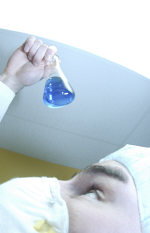 The percentage of off-patent medicines in EU pharmacies that contain falsified active pharmaceutical ingredients (API) - in other words not from the approved, labelled source - could be as high as 20-30 per cent, according to the European Fine Chemicals Group.
The percentage of off-patent medicines in EU pharmacies that contain falsified active pharmaceutical ingredients (API) - in other words not from the approved, labelled source - could be as high as 20-30 per cent, according to the European Fine Chemicals Group.
EFCG board member Guy Villax quoted that figure, which he attributed to EU inspectors, at a press conference at the Conference on Pharmaceutical Ingredients (CPhI) held earlier this week in Madrid, Spain.
At the conference Villax described falsified APIs as an "invisible danger" to millions of people around the world, with a single API batch having the potential to reach 10,000 to 1,000,000 patients.
Villax pointed to an apparent increase in so-called 'facade' constructions, in which a company with Good Manufacturing Practice (GMP) certification from a recognised body such as the US Food and Drug Administration supplies not only API from its own factory, but also material originating from non-certified suppliers, sometimes via traders and brokers, that is passed off as its own.
"This has been established as a classic process in China," said Villax at a press conference held at the CPhI exhibition in Madrid, Spain, earlier this week.
He also called for more stringent penalties for those involved in the trade in falsified APIs and medicines.
"In most of the world, counterfeiting of medicines, in terms of law, is no more serious than trademark or patent infringement, and I think we should be really worried about that," said Villax.
He held up as exceptions that rule France, Germany and the USA, which have enacted legislation classing medicines counterfeiting as a serious crime, but pointed out that only the Philippines has extended this to include falsified APIs or excipients as well as finished products.
European legislators are taking action, he said, pointing out the European Parliament's directive on medicines counterfeiting which was released in a first draft last year, and the Council of Europe's efforts to develop a convention on counterfeiting of medical products which remains in draft form.
The convention is an interesting development, he said, because once finalised it can fairly quickly be ratified and brought into national law by the 40 countries coming under the CoE umbrella.
However, EFCG does not agree with the current wording of the EU's draft directive which suggests that API manufacturers can be inspected by their own domestic authorities, if their enforcement systems are deemed 'equivalent' by the EU, i.e. they conform to ICH Q7 and are based on regular inspections.
This would work with countries such as the USA, Japan and Australia, said Villax, but he is concerned that equivalence could be granted for political reasons to other countries where the systems may be prone to fraud and corruption.
That said, if the bills become law and are ratified nationally, there will be some serious consequences for activities such as labelling an API as coming from a different source than the true one, or tampering with a certificate of analysis to change a manufacturing date.
Meanwhile, across the Atlantic, the US Drug Safety Bill (S.882), designed to ensure the safety and quality of medical products and give the FDA greater authority, has been referred to the Committee on Health, Education, Labor, and Pensions.
This is asking for mandatory API facility inspections worldwide by the FDA at a frequency of once every two to four years, depending on a supplier's track record, said Villax, who welcomed the FDA's ongoing programme of expanding its overseas inspection capacity.
Finally, the industry is taking its own steps to tackle the issue, said Villax. Companies seem to be auditing API suppliers more frequently and sharing audits, while there seems to be a shift towards more direct relationships between API users and manufacturers and less reliance on brokers and middlemen.
EFCG recently put together a 10-point list of elements that it believes could fix the problem of rogue APIs entering the European market, including:
1. Mandatory GMP Certification by a European inspectorate for APIs
2. Global prioritisation of API inspections on a risk basis
3. The creation of a central European unit to coordinate API inspections worldwide
4. Including a focus on fraud and counterfeiting within GMP inspections, something that is already well established at the US FDA
5. Resolving resource problems for inspections through user fees
6. Use of analytical technologies by authorities and industry to detect counterfeit APIs (e.g. NIR spectroscopy)
7. IT system that link customs with regulatory agencies to help stop importation of counterfeit APIs, again something that is well established in the USA
8. Introduction of tough sanctions and penalties for API counterfeiting
9. Introduction of a licensing system for traders and brokers
10. Clarification of the legal liability of Qualified Persons
Related articles:
EFCG unveils supply chain security template
©
SecuringIndustry.com




 The percentage of off-patent medicines in EU pharmacies that contain falsified active pharmaceutical ingredients (API) - in other words not from the approved, labelled source - could be as high as 20-30 per cent, according to the European Fine Chemicals Group.
The percentage of off-patent medicines in EU pharmacies that contain falsified active pharmaceutical ingredients (API) - in other words not from the approved, labelled source - could be as high as 20-30 per cent, according to the European Fine Chemicals Group.